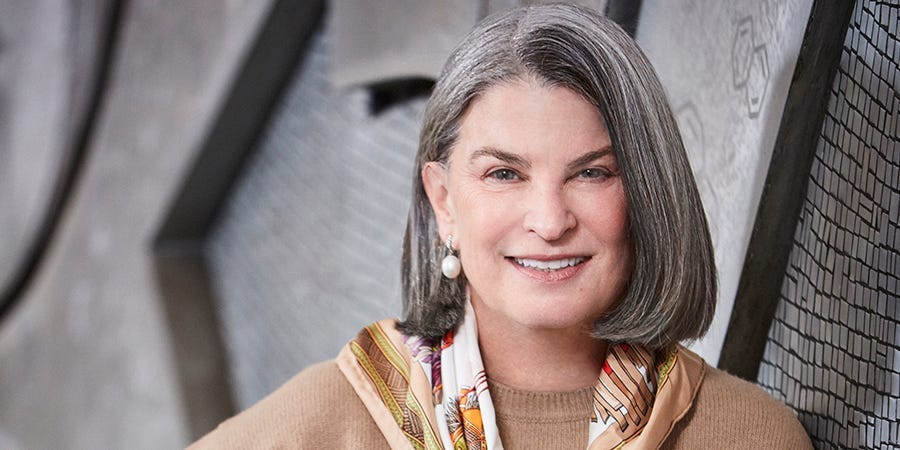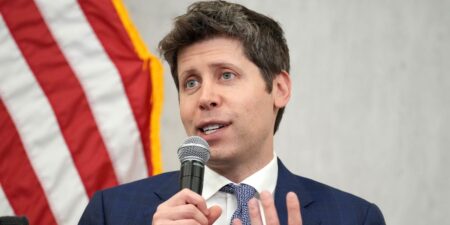In early 2020, Pfizer Communications and Policy Chief Sally Susman was stunned when the head of the pharmaceutical company revealed plans to bring a COVID-19 vaccine forward by the end of that year.
“It was literally the boldest, most audacious statement I have ever heard,” Susman told Business Insider shortly after announcing last week plans to end her nearly two-decade run at Pfizer at the end of 2025.
A pioneer of modern corporate communications, Susman described the months that followed as a career-defining opportunity to help build people’s trust in the company during an extraordinary time of uncertainty and fear. Amid a barrage of media attention, she pushed for Pfizer to be as transparent as possible about its work, such as by taking steps to safely embed reporters into its clinical trials.
“All these things came together in a way that you rarely get a chance to do,” said Susman, author of the book “Breaking Through: Communicating to Open Minds, Move Hearts, and Change the World,” published by Harvard Business Review Press in 2023. “I always say to people who are in the profession, you don’t know what day your life is going to change, when your company is faced with just an unprecedented situation.”
Susman’s pending exit from Pfizer comes as the company is undergoing a restructuring effort due to a number of factors, including slowing demand for its COVID-19 vaccine, expected patent losses, and struggles to gain traction in the booming obesity drug market.
Pfizer said her external communications, global policy, patient advocacy, and other duties will be divided among several top executives and she will remain on the board of its philanthropic foundation.
“This was the right time for the company and for me to make changes,” said Susman. “I have absolutely loved it, but I do have other passions.”
Why corporate comms matters
Susman, 63, started in corporate communications a few years after graduating from Connecticut College in the 1980s, when the field was still relatively new. She said engagement with consumers, investors, and other stakeholders was a trend taking shape at the time, starting with the AIDS crisis.
“Then I watched it take hold with environmentalists, with breast cancer survivors, with labor unions,” she said. “People sort of rose up and felt that they had a say in the world.”
Later, social media further elevated the importance of corporate communications, Susman said, as companies needed help managing relations with the public online.
Yet it was a legal battle that kicked off in 1996 by her then-employer American Express against its rivals Visa and Mastercard over anti-competition allegations that underscores for her why corporate affairs is such a critical function.
“The successful conclusion of the lawsuit was really driven by a supportive communications and government-relations strategy,” said Susman, who was American Express’s vice president of European corporate affairs at communications at the time. “That’s when I had the big aha.”
Susman has worked under nine chief executive officers throughout her career, including three at Pfizer. “There’s nothing more gratifying than having the honor of advising a CEO on their most pressing concerns and opportunities,” she said. “That’s the rare air.”
Deirdre Latour, a former communications chief at General Electric, said on LinkedIn that it is hard to overstate the impact of Susman on the corporate communications profession.
“When I think of Sally the following words come to mind…smart, kind, consistent, resilient, focused, accomplished, curious and fun,” Latour wrote. “She has seen and done it all.”
‘Like right out of a movie’
A major career highlight for Susman came on a Sunday in November of 2020. She recalled wearing a face mask and waiting in a conference room several feet apart from Pfizer Chief Albert Bourla and a handful of other Pfizer executives to learn if the COVID-19 vaccine the company had been developing was viable. It turned out to be safe and effective.
“Even though the health regulations said we shouldn’t do this, we all hugged, we cried, and we called our loved ones,” she recalled. “It felt like right out of a movie.”
Though Pfizer did contribute to a documentary about the pandemic, the company’s story hasn’t yet been made into a Hollywood production. Susman said she can picture that happening one day.
“I hope someone good plays me,” she said, declining to name names. “I’ll leave that to others to cast.”
Retirement is still a ways off for Susman. In September she’ll be joining a new, six-month program at the Aspen Institute for those who have achieved success in life but are looking to make a greater impact.
“It’s where people try to answer for themselves, what’s next?” Susman said. “I am deep in discovery around that question.”
Read the full article here
















